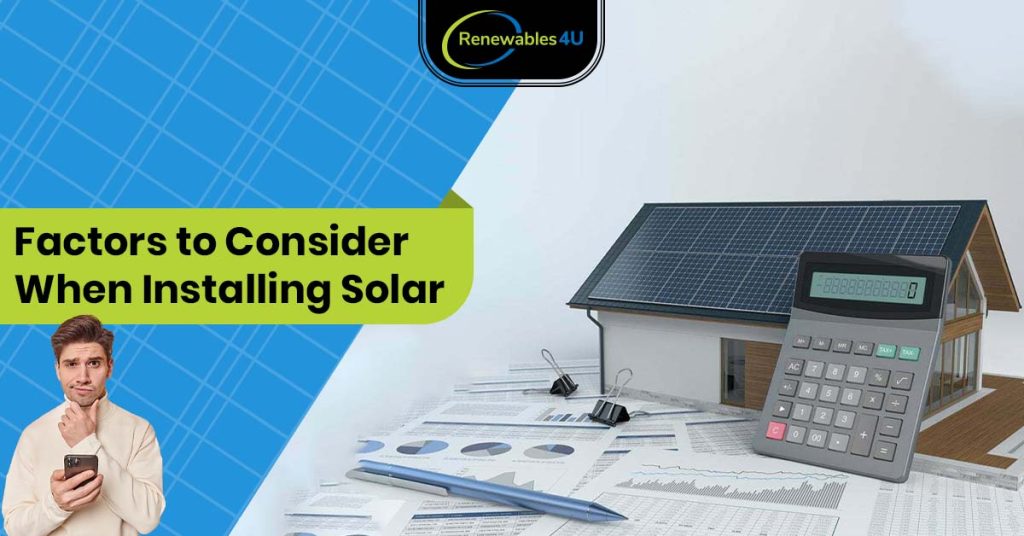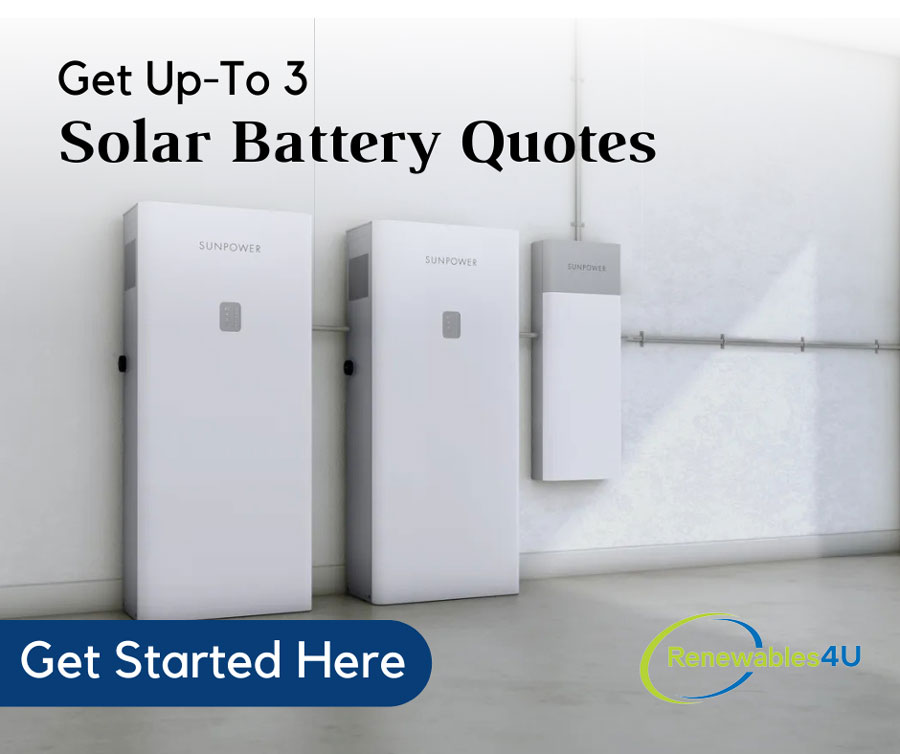
Installing a solar battery system is a significant step towards energy independence. But it comes with its own set of considerations.
You need to understand some key aspects before making such a big decision. Otherwise, you will just make a wasteful investment.
Here are some questions for you to answer.
What are you trying to achieve?
Do you want to go completely grid-independent or have a little backup power should you need it?
Batteries are not particularly cheap. However, if you live in an area with constant grid outages, they would be worth their weight in gold. It’s mainly to keep the WiFi on and the kids quiet rather than the fridge working nowadays.
In all seriousness, going independent requires careful planning. You’ll need to purchase a battery that’s large enough to sustain you through the night.
Also, it should have the capacity to run your home comfortably. This is crucial for cases where you might face a couple of days with low solar irradiance.
BUT if you want a battery to store some excess power, to run things partially into the night and be there as a support mechanism should the grid go down, then a smaller battery will be fine.
What is the cost and the ROI?
Calculate the initial cost of the battery, installation, and maintenance against potential energy savings over its lifespan.
The cost of the battery itself, along with installation and ongoing maintenance, can vary depending on the type and size of the system.
To understand the return on investment (ROI), calculate the potential energy savings the battery will provide over its operational lifespan, which typically ranges from 5 to 10 years.
Assess the payback period – the time it takes for the savings to cover the initial cost.
And consider any additional financial benefits such as:
- reduced reliance on the grid
- potential increases in property value
- eligibility for any government incentives or rebates
These will give you a clearer financial picture of installing a solar battery into your existing solar system.
What size battery should you install?
Choosing the right solar battery size involves assessing your home’s energy usage, understanding solar system output, and considering battery capacity and cost.
The ideal battery size should meet your daily needs, offer sufficient backup, and align with your budget. There should be a balance between practicality and efficiency.
Choosing the right size involves numerous factors beyond the scope of this article.
Learn the details on how to choose solar battery size here.
Do you have the space?
Assess if you have enough space for the battery’s size and weight. Account for ventilation and temperature requirements. This is crucial for either indoor or outdoor installation.
Some batteries aren’t suitable for all outdoor weather conditions. They might need protection from dust and water.
Some other batteries will need fire-proofing behind them if installed in certain locations.
If you’re considering the garage, you may need extra space for a bollard in front of the battery.
Will you need a backup box?
This is a BIG one, many people think that they will purchase a battery, and that’s it. So when the grid goes down, you can still use EVERYTHING in your house as normal. NO! This is not the case.
Generally speaking, most installation companies will only focus on wiring essential loads for backup in case the grid goes down. They include your kitchen, some lights, and power points.
The goal is to keep the fridge running and allow you to cook food. You’ll also have lights for visibility. Plus, they ensure your TV and WiFi stay on so you don’t get bored.
Things like air-conditioners, pool heaters and water pumps will not be backed up. This is because when those higher-demand items start-up, they use a massive spike in power that the batteries can’t and don’t like to deliver.
Some batteries do not come with backup as standard, and require a separate backup box. So make sure you discuss this with your installation company.
DON’T FORGET – If you want a backup, then your battery will be set with a ‘reserve amount’ of around 20-50% to be used in a grid outage! This means that your battery will NEVER discharge past this amount.
For example, let’s say you purchased a 10 kW battery, thinking you will charge that during the day, and use it throughout the night. But, the installation company set it with a 50% reserve!
This means you’ll only use 5 kW and then draw power from the grid. Without knowing, you are only getting 50% of the savings you thought you would!
So this is a MASSIVE thing to talk about with your installation company.
Which battery coupling type do you need, AC or DC-coupled?
AC-coupled battery is generally used if you ALREADY have a solar system installed. Ensure compatibility and proper integration of the battery as these issues could affect performance and efficiency.
The majority (except Tesla Powerwall) will NOT have black start capabilities. They are also charged ONLY by the excess solar you produce.
DC-coupled battery is used if you have a HYBRID inverter. They allow you to store/supply energy in direct current, making them more efficient. You can maximise the utilisation of your solar array.
For example, you have a 5 kW inverter with 6.6 kW of panels and are currently using 4 kW of power in the home. An AC-coupled battery will only have 1 kW available to charge with, whereas a DC-coupled battery will have 2.6 kW free power to charge with.
What is the battery’s usable capacity? (Depth of Discharge)
The Depth of Discharge (DoD) indicates how much of the battery’s total capacity can be used without affecting its lifespan.
Different batteries have different DoD. Some are designed to perform better with shallow discharges, while others can handle deeper discharges.
Always refer to the data sheet of the specific battery model you’re considering.
For example, the Tesla Powerwall is advertised as a 14 kWh battery, yet its actual usable capacity is 13.5 kWh. This distinction can significantly influence your system’s overall performance and efficiency.
Does it have monitoring and control features?
The ability to monitor and control your solar battery is a key feature that can greatly affect its usability.
Check if the battery includes an integrated monitoring system. This feature allows you to track energy usage, battery charge status, and overall performance metrics. It can also help in identifying any issues early.
Many modern solar batteries come equipped with user-friendly apps or online platforms. They allow you to access this information from your smartphone or computer.
Additionally, some systems offer the capability to remotely control the battery’s charging and discharging cycles. In short, you can control your cost savings.
Which solar battery manufacturer is best?
Choose reputable brands or manufacturers with a track record of quality products and good customer support. Research reviews and feedback from other users.
Renewables4U supports the installation of all manufacturer brands within our ‘circle of trust’.
Learn more about our top picks for the best solar battery model for home installation.
Is the battery safe for home installation?
Look for safety certifications to ensure the battery meets industry standards and is safe for home use.
Ensure the installation is carried out by qualified professionals and aligns with local building and electrical codes.
This adherence to regulatory standards not only safeguards your home but also ensures the optimal functioning of the battery.
Which solar installation company to choose?
This is by FAR the MOST important! There are so many companies out there selling solar batteries that the list is endless.
The problem is they are NOT all reputable. And worst of all, they are uneducated in solar batteries and don’t know what they are talking about.
They just want to sell you a battery and take your money without ensuring that it is actually capable of fulfilling your needs and wants. Believe me, we have heard some absolute horror stories.
We are NOT going to make light of this as this is a real consequence of badly installed batteries, A FIRE. Yes, it can be that serious.
A professional will come out to see you, go through what you are trying to achieve with a battery, look at various installation areas and provide you with a proposal that meets your needs.
Consult with a Solar Energy Expert
Taking the considerations above into account can help you make an informed decision when installing a solar battery that best suits your home’s energy needs and complements your solar panel system.
Consulting with solar energy experts or installers can also provide valuable guidance tailored to your specific situation.
Renewables4U was set up to help simplify the marketplace with honest and trustworthy advice. This is the reason why we provide you with solar battery quotes from local professional solar companies in your area.
We do not pass your details on to small companies, that don’t have their own office, haven’t been in the industry for years, and don’t pass our assessment to be our endorsed suppliers. (Unlike the other quote companies out there!)
If you found the information above helpful, let us connect you with 3 local suppliers for personalized quotes.
Reviewed by

Tom Ransome
Co-Founder of Renewables4U and renewable energy advocate. He has experience and extensive knowledge in the field, including a groundbreaking academic thesis and a significant role in Australia's solar industry since 2016. With a BA in Business Studies, focusing on finance and management, Tom merges business acumen with technical expertise to deliver economically and eco-friendly projects.

